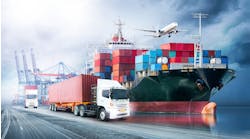Here Comes the World’s First, All-Electric Autonomous Cargo Ship
Download this article in PDF format.
At a time when organizations are looking for any way possible to streamline transportation and logistics and make both more affordable, a Norwegian company is taking the first steps to achieving the dream of an all-electric, autonomous cargo ship. As it traverses the world’s oceans, the innovative ship may also help to reduce greenhouse gas (GHG) emissions for a transportation sector that emitted 1,076 million tonnes of carbon dioxide (CO2) in 2018 (up from 977 million in 2012).
According to the International Maritime Organization (IMO), ocean shipping’s total share of GHGs (including CO2, methane and nitrous oxide) increased from 2.76% in 2012 to 2.89% in 2018. Yara International could be among the first to start moving the needle in a direction that’s more positive for the environment.
Maiden Voyage
According to CNN, Yara has built what it’s calling the world's “first zero-emission, autonomous cargo ship,” which will make its maiden voyage between two Norwegian towns sometime in the next few months. The first trip will include a scaled-down crew for testing the ship’s autonomous systems, but the eventual goal is for all of the vessel’s movements to be monitored and controlled from three onshore data control systems.
The “Yara Birkeland” was first conceptualized in 2017 and created in partnership with technology firm Kongsberg Maritime and shipbuilder Vard. “Capable of carrying 103 containers and with a top speed of 13 knots, it will use a 7 MWh battery, with about a thousand times the capacity of one electrical car,” Yara’s Jon Sletten told CNN.
The ship is then charged quayside “before sailing to container harbors along the coast and then back again, replacing 40,000 truck journeys a year,” he continued. Along with providing a more eco-friendly ocean transportation option, the autonomous nature of the Yara Birkeland makes the ship more effective to operate, CNN reports.
Initially, loading and unloading the ship will require humans, it adds, but all loading, discharging and mooring operations, including berthing and unberthing the vessel, will also eventually operate using autonomous technology. “That will involve developing autonomous cranes and straddle carriers that place containers onto ships,” CNN adds.
A Growing Sector
Yara isn’t the only organization that’s allocating time, effort and money into the autonomous shipping industry. According to Allied Market Research, the autonomous ships market size was valued at $85.84 billion in 2020 and is projected to more than double in size to reach $165.61 billion by 2030.
Also known as “crewless ships,” these vessels are equipped with the software and hardware that require no onboard human intervention. Key technology components that go into these ships include sensors, automated navigation, GPS trackers and propulsion and auxiliary systems. Combined, these innovations help ships to make decisions in accordance with their environments.
“Moreover, the partially-automated ships are controlled and monitored through the offboard control centers with the interference of humans,” the research firm adds. “In addition, autonomous ships have their complete operations controlled by the advanced operating systems, which enables it to make decisions and take actions by itself.”
Japan Gets into the Autonomous Ship Race
In Japan, the Nippon Foundation wants to see crewless ships make up 50% of the country’s local fleet by 2040. In fact, Bloomberg says that a group that includes Japan’s largest shipping company, Nippon Yusen KK, plans to have a container ship pilot itself from Tokyo Bay to Ise (a coastal city in central Mie prefecture) in February.
According to Nippon Yusen, the 236-mile voyage will be the world’s first test of an autonomous ship in an area with heavy marine traffic. “When it comes to the automation of ships, our mission is to have Japan lead the rest of the world,” Japan Marine Science Inc.’s Satoru Kuwahara told Bloomberg.
The Nippon Foundation estimates that taking into account factors like artificial intelligence (AI), which should improve efficiencies, the development of unmanned ships will have a positive impact of about 1 trillion yen ($9 billion) for Japan’s economy in 2040. Lower carrier insurance payments and improved safety are the other potential benefits in an industry where human error causes about 70% of all accidents.










